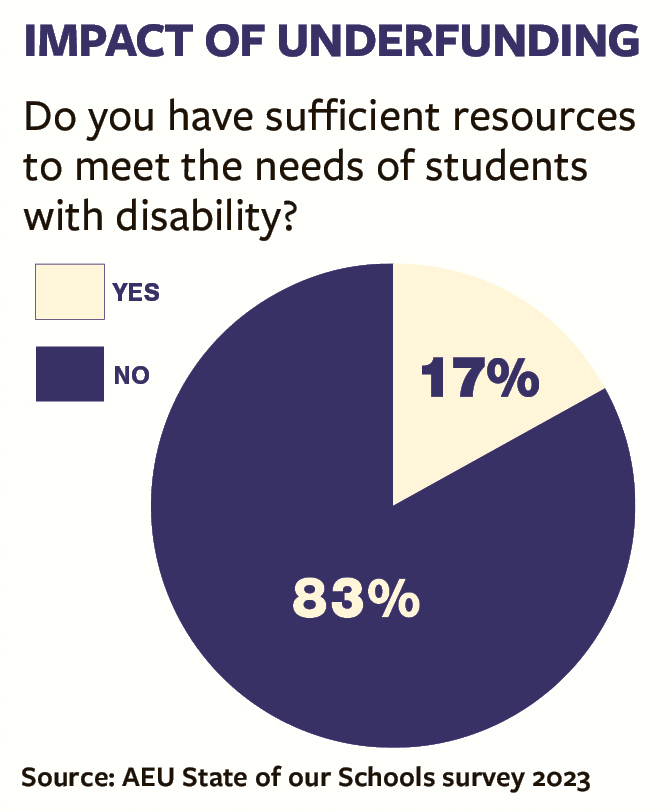One of the easiest things both the federal and state governments could do to address increased student complexity and the workload of teachers in public schools would be to increase funding.
In 2016, the first full year of implementation of the Nationally Consistent Collection of Data on Students with Disability, the NSW Auditor General reported Department of Education figures estimating there were 91,000 students with disability in NSW public schools, with 80 per cent learning in mainstream settings.
Fast forward to 2023 and that number has more than doubled with NSW Education Minister Prue Car reporting 206,000 students with disability in NSW public schools in February, with 86 per cent in mainstream settings.
The growth in students with disability was a key feature of Federation’s submission to a recent parliamentary inquiry and will continue to be a focus of the union’s contribution to the Australian Education Union’s For Every Child campaign.
BILATERAL FUNDING AGREEMENTS MUST ADDRESS FUNDING FOR STUDENTS WITH DISABILITY
Federation’s Senior Vice President Natasha Watt, who gave evidence before the inquiry on behalf of the union, is adamant that funding for students with disability must be urgently addressed in the bilateral funding agreements currently being negotiated.
More funding and improved staffing are key enablers in allowing teachers to improve student learning and the public education system.
“Currently NSW public schools are only funded to 88 per cent of the minimum standard required for students to succeed and almost 30 per cent of NSW students requiring learning adjustments receive no additional funding through the Nationally Consistent Collection of Data’s Quality Differentiated Teaching Practice,” Ms Watt said.
“This means students with disability and identified learning needs continue to be shortchanged.”
“My travels across the state have brought me into contact with members who are committed to improving the learning of their students yet continue to suffer the effects of ballooning workloads created by the legacy of the former government.
“It is of great concern that past inquiries, both independent and government, have warned about the risks of underfunding students with disability,” Ms Watt added.
In the Students with a disability or special needs in NSW schools inquiry report (2017), the portfolio committee commented: “…to date students with disabilities and special needs have not benefited from clear or equitable recurrent funding (…)The committee reiterates the concern expressed by the 2010 Upper House inquiry that the NSW Government risks breaching their legal obligations to students with disability. Similar to 2010, participants during this inquiry indicated that students with disabilities and special needs in New South Wales cannot equitably access and participate in education on the same basis as their peers, due to a continued lack of funding.”
“In January this year the media reported there were 185 full-time vacancies for teachers trained to support students with disability. There were 162 vacancies for Autism support teachers and more than 150 unfilled roles for teachers specialising in behaviour difficulties and extra needs,” Ms Watt said.
“Students, parents and the community deserve better.
“More funding will allow the system and profession to better serve our communities, it will create opportunities for more one-on-one time in our classrooms, increased staffing entitlements and additional release time to allow teachers to collaborate and develop pedagogy to suit the individual needs of students.”
LONGSTANDING NEEDS
Federation’s officer attached to students with disability issues, Emma Bruce, spent a decade working in one of NSW’s largest schools for specific purposes and also appeared on Federation’s behalf at the recent inquiry.
“What’s incomprehensible is the fact that as far back as 2018 the Department admitted in documents that were released under freedom of information that they were failing to deliver excellence consistently across NSW for every student with disability,” she said.
“Here we are again, six years later and at another government inquiry talking about the failings of funding and support policies for our most disadvantaged students.”
Asked about a recent announcement from the Government to increase support classes available across educational settings in public schools, Ms Bruce points out another key failing of the previous government linked to a broader issue still facing the new minister.
“Support for students is welcomed, but this highlights the growing need that exists in our schools. Modelling undertaken by the former government revealed a potential need to double the number of existing classrooms available as well as building multiple additional SSPs a year just to keep up with growth.”
THE INVESTMENT WE NEED
- Increase the number of qualified teachers and education support personnel
- Deliver more time for teachers to consult with students and family/ carers, develop and implement individual education plans and classroom adjustments
- Give teachers time to collaborate with their colleagues, specialist teachers and allied health professionals and undertake professional learning
- Improve system-wide support and ongoing professional development to help principals, teachers and learning support teams
- Increase allied health support in schools to ensure rapid response to student needs
NSW government calls for additional funding in next funding agreement
The NSW Government’s submission to the Review to Inform a Better and Fairer Education System called on the Federal Government to be sensitive to the needs of students with disability, stating:
“The number of students with additional learning and support needs across all school settings continues to grow and many have more complex needs. Capital funding remains a crucial lever to facilitate such supports, in alignment with a key recommendation from the Gonski Review. This must be considered in the next [National School Reform Agreement] if we are to lift outcomes and create inclusive educational environments for students with disability. If we can appropriately better support students with disability through national collaboration, we will be better placed to get it right for all students and see the desired shifts in education outcomes.”
Sources: Department of Education, Day 1, 2024: A Snapshot and NSW Government media release 19 February 2024
